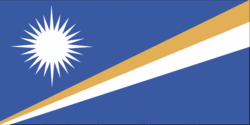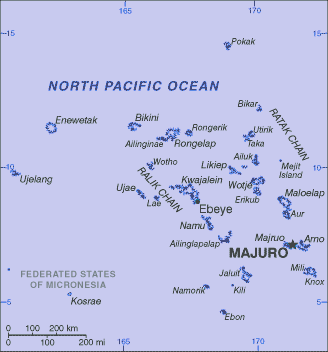Traveling Luck for Marshall Islands. Marshall Islands, Oceania
Marshall Islands is located in Oceania, two archipelagic island chains of 29 atolls, each made up of many small islets, and five single islands in the North Pacific Ocean, about one-half of the way from Hawaii to Australia.
Land in Marshall Islands is low coral limestone and sand islands.
Marshallese land covers an area of 11854.299999999999 square kilometers which is about the size of Washington, DC
 Marshallese national flag (Flag of Marshall Islands)
Marshallese national flag (Flag of Marshall Islands)
As for the Marshallese climate; tropical; hot and humid; wet season May to November; islands border typhoon belt.
Marshallese (singular and plural) speak Marshallese 98.2%, other languages 1.8% (1999 census)
note: English widely spoken as a second language; both Marshallese and English are official languages.
 Marshallese map
Marshallese map
Regions of Marshall Islands
After almost four decades under US administration as the easternmost part of the UN Trust Territory of the Pacific Islands, the Marshall Islands attained independence in 1986 under a Compact of Free Association. Compensation claims continue as a result of US nuclear testing on some of the atolls between 1947 and 1962. The Marshall Islands hosts the US Army Kwajalein Atoll (USAKA) Reagan Missile Test Site, a key installation in the US missile defense network.
US Government assistance is the mainstay of this tiny island economy. Agricultural production, primarily subsistence, is concentrated on small farms; the most important commercial crops are coconuts and breadfruit. Small-scale industry is limited to handicrafts, tuna processing, and copra. The tourist industry, now a small source of foreign exchange employing less than 10% of the labor force, remains the best hope for future added income. The islands have few natural resources, and imports far exceed exports. Under the terms of the Amended Compact of Free Association, the US will provide millions of dollars per year to the Marshall Islands (RMI) through 2023, at which time a Trust Fund made up of US and RMI contributions will begin perpetual annual payouts. Government downsizing, drought, a drop in construction, the decline in tourism and foreign investment due to the Asian financial difficulties, and less income from the renewal of fishing vessel licenses have held GDP growth to an average of 1% over the past decade.
Marshallese natural resources include coconut products, marine products, deep seabed minerals
Bikini and Enewetak are former US nuclear test sites; Kwajalein, the famous World War II battleground, is used as a US missile test range; island city of Ebeye is the second largest settlement in the Marshall Islands, after the capital of Majuro, and one of the most densely populated locations in the Pacific
Marshallese religion is Protestant 54.8%, Assembly of God 25.8%, Roman Catholic 8.4%, Bukot nan Jesus 2.8%, Mormon 2.1%, other Christian 3.6%, other 1%, none 1.5% (1999 census).
Natural hazards in Marshall Islands include infrequent typhoons.
Travel Advice for Marshall Islands
Marshall IslandsSUMMARY
- There is no British consular representation in the Marshall Islands. Consular matters are covered by the British Embassy in Manila, the Philippines. However, the British Honorary Consular Agent can be contacted in an emergency. Please see the General section of this travel advice for contact details.
- Only a handful of British tourists visit the Marshall Islands every year. Most visits to the Marshall Islands are trouble-free. We are not aware of any British nationals who have required consular assistance in the Marshall Islands in the past year.
- The threat from terrorism in the Marshall Islands is low. But you should be aware of the global risk of indiscriminate terrorist attacks which could be against civilian targets, including places frequented by foreigners.
- We strongly recommend that you obtain comprehensive travel and medical insurance before travelling. You should check any exclusions, and that your travel policy covers you for the activities you want to undertake. Please see : Travel Insurance.
SAFETY AND SECURITY
LOCAL LAWS AND CUSTOMS
ENTRY REQUIREMENTS
Single parents or other adults travelling alone with children should be aware that some countries require documentary evidence of parental responsibility before allowing lone parents to enter the country or, in some cases, before permitting the children to leave the country. For further information on exactly what will be required at immigration please contact MIVA, PO Box 5, MH96960; tel: +692 625 6482; fax: +692 625 6771; E-mail: tourism@ntamar.com.
HEALTH
Medical facilities are generally adequate for routine medical procedures. For more serious or complicated problems, medical evacuation to Honolulu may be required.
GENERAL

 Search
Search Marshall Islands country profile
Marshall Islands country profile Travel advice for Marshall Islands
Travel advice for Marshall Islands